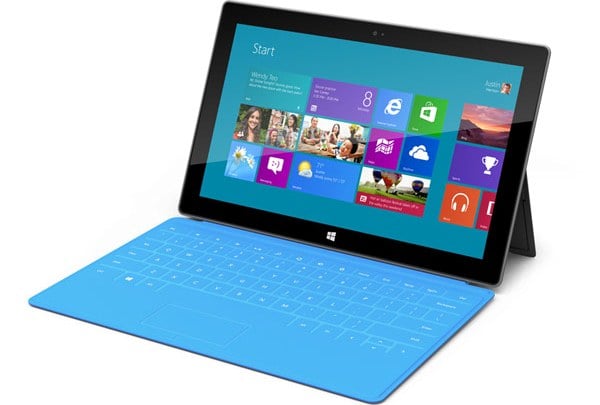Microsoft Corporation (NASDAQ: MSFT) was supposed to have a big game-changer on its hands with Windows 8. Maybe you can blame Apple Inc. (NASDAQ: AAPL) or maybe you can blame the economic environment. However you cut it, Windows 8 did not exactly bring the love for investors that many were hoping for. In a research note on Monday, Stern Agee’s Shaw Wu shared his predictions for 2013’s PC and other key emerging tech markets. The summary might be taken as an omen: “We are not as upbeat on Windows 8.” Source: courtesy of Microsoft
Source: courtesy of Microsoft
Today’s note suggests that one of the big questions for 2013 is wether or not Windows 8 can help spur a PC upgrade cycle. Wu said, “In short, we think the answer is yes, but likely more muted than many think.” He showed that the current market research is forecasting growth of 7% to 9%, but Wu thinks that growth is going to end up closer to 2%. If that comes true, then more pain is coming for Microsoft. We were more than a bit cautious and skeptical when our year-end analysis showed that Microsoft had the most upside of all Dow Jones Industrial Average components in 2013. Wu issued some things to consider:
- (1) continued cannibalization from mobile devices using iOS and Android;
- (2) slow adoption curve for Windows 8 given the big change in its user interface;
- (3) growth likely to be driven by emerging markets; and
- (4) share gains by low-cost Asia-Pac players and Apple with its highly differentiated Macs.
Wu also said, “We find price points for Windows 8 hardware uncompetitive at $500 to $1200 vs. Android as low as $99 and iPad mini at $329.” The good news is that Wu thinks 2012 will be a very easy year for comparisons and that lower-cost and differentiated players including Lenovo, Asustek, AAPL, Samsung, and possibly Acer will add to that growth. We sees some Windows 7 growth due to its much more familiar user interface as some users migrate from Windows XP who opted to skip Vista.
Other issues were cited as well. Wu talked about emerging markets and mobile devices would drive growth along with the BRIC countries offsetting declines in more mature markets like the U.S. and Western Europe. Portable PCs should show mid-single digit growth offsetting the decline in desktop PCs.
Hewlett-Packard Co. (NYSE: HPQ) and Dell Inc. (NASDAQ: DELL) are expected to continue to lose some market share in 2013. Apple Inc. (NASDAQ: AAPL) is viewed as an outlier but a share gainer due to its highly differentiated Mac. Wu is less Upbeat on Windows 8 despite some market research firms anticipating that the PC market will show re-accelerated growth in 2013 due to Windows 8. The refresh cycle for Windows 8 is expected to help but the uptake and adoption will not be as big and fast as many forecast according to Wu.
Elsewhere, Wu sees a continued shift towards mobile devices being powered by iOS and Android. He went as far as saying that he finds most Windows 8 hardware overpriced with no clear benefit in switching from iOS or Android. Another issue of concern is that feedback from supply chain sources has warned that there is great confusion with too many form factors like PCs, notebooks, tablets, ultrabooks, and convertibles.
Microsoft shares are trading around $26.75 and that is in line with year-end price of $26.71. Thomson Reuters still has a consensus of $34.44, which implies upside of almost 29%. Microsoft also has that 3.5% dividend yield but the $34.44 price target is against a 52-week trading range of $26.26 to $32.95.
Essential Tips for Investing: Sponsored
A financial advisor can help you understand the advantages and disadvantages of investment properties. Finding a qualified financial advisor doesn’t have to be hard. SmartAsset’s free tool matches you with up to three financial advisors who serve your area, and you can interview your advisor matches at no cost to decide which one is right for you. If you’re ready to find an advisor who can help you achieve your financial goals, get started now.
Investing in real estate can diversify your portfolio. But expanding your horizons may add additional costs. If you’re an investor looking to minimize expenses, consider checking out online brokerages. They often offer low investment fees, helping you maximize your profit.
Thank you for reading! Have some feedback for us?
Contact the 24/7 Wall St. editorial team.



